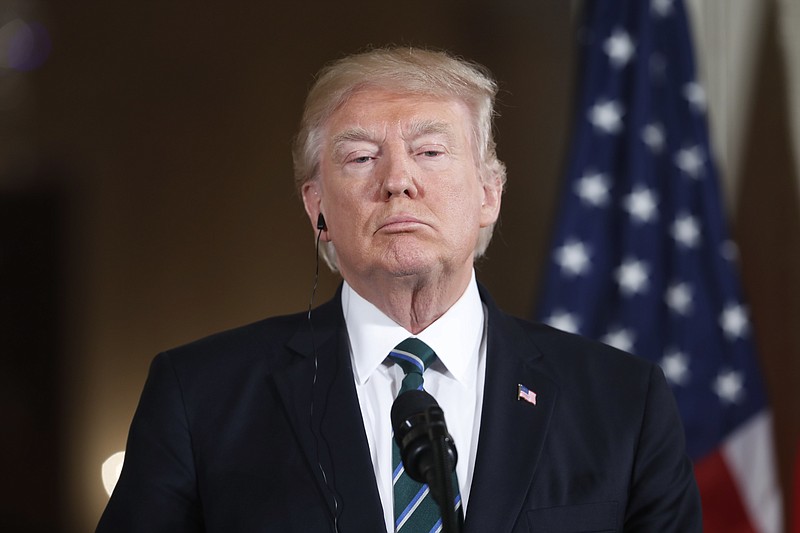Every president has an early foreign policy test, and Donald Trump is no exception. Trump's test is actually already in progress, and it bears some resemblance to the one faced by a young President John Kennedy. Indeed, Trump's crisis has best been described as a "slow-motion Cuban missile crisis" - only the crisis-driver is not Fidel Castro, but North Korea's bizarre despot, Kim Jong Un.
If this crisis is not keeping you up at night, you're not paying attention.
Let's see, we have an untested, macho, Twitter-happy U.S. president facing off against the leader of a dynastic North Korean political cult who's building a long-range nuclear missile that could hit Los Angeles and who - allegedly - just had his half brother, Kim Jong Nam, knocked off by two women who wiped his face with a lethal nerve agent while he was transiting a Malaysian airport.
Hey, what could go wrong?
We need to address this now. Hard to believe, but this hermit kingdom with an economy the size of Dayton, Ohio, "is at a point where it could, by 2020, have a nuclear arsenal half the size of Great Britain's with missiles capable of striking the U.S. homeland," said Robert Litwak, from the Wilson Center, one of the premier experts on rogue states.
Have a nice day!
While all eyes here have been focused on Trump, North Korea has been focused on perfecting the miniaturization of its nuclear stockpile into warheads that could fit on long-range ballistic missiles and on methodically testing those missiles, with mixed success, so far.
Trump did not create this problem - it's been passed down to him from Presidents Bill Clinton, George W. Bush and Barack Obama - but he will have to fix it. And it has reached a point where the U.S. has only three options: awful, bad and worse. Or as Litwak describes them: "bomb, acquiesce or negotiate."
Bombing North Korea's nuclear and missile sites runs the risk of escalating into a second (possibly nuclear) Korean war with over a million casualties. North Korea's nuclear facilities are "hot," and bombing them could have untold consequences in terms of radioactivity. Alternatively, acquiescing to a breakout means this failed state could - incredibly - become a major nuclear power with a global reach. "So that just leaves negotiating," says Litwak.
Donald Trump negotiating with Kim Jong Un does have a certain pay-per-view quality about it, but it's the least bad option. And to make it more interesting, the model that Trump should follow, argues Litwak, is the nuclear deal that Obama struck with Iran, which Trump once described as "the worst deal ever negotiated."
Think again.
Obama had the same three choices on Iran: bomb, acquiesce or negotiate. He did not want to bomb Iranian nuclear installations, because of the uncontrollable events bombing could unleash, and he did not want to acquiesce. So Obama negotiated what Litwak calls a "purely transactional" deal - Iran agreed to a 15-year halt on processing weapons-usable fissile material in return for significant sanctions relief, and no other behaviors were covered.
Obama's bet? Something will happen in those 15 years that will be "transformational," says Litwak, and provide the only true security - a change in the character of Iran's regime.
Trump should follow that path, argues Litwak: Get North Korea to freeze its nuclear warheads at present levels - around 15 - freeze all production of weapons-usable fissile material and freeze all ballistic missile testing - so it cannot hit the U.S. - in return for an easing of economic sanctions and some economic aid.
"It would be a transactional deal that constrains North Korea's capabilities and buys time for a transformation, just like the Iran deal did," says Litwak. The Kim cult should go for it, because it keeps them in power with a minimum deterrence against a U.S. invasion. And China might finally be willing to help with this deal, because freezing North Korea's nuclear capability would likely forestall China's rivals - Japan and South Korea - from getting nukes of their own. But Trump will need China, so he'd better think twice about starting a trade war with Beijing.
Trump will soon discover that in foreign policy, everything is like Obamacare - easy to criticize, more transactional than transformational, but all the other options are worse. And there are no pure wins to boast about. Those only happen on TV shows.
